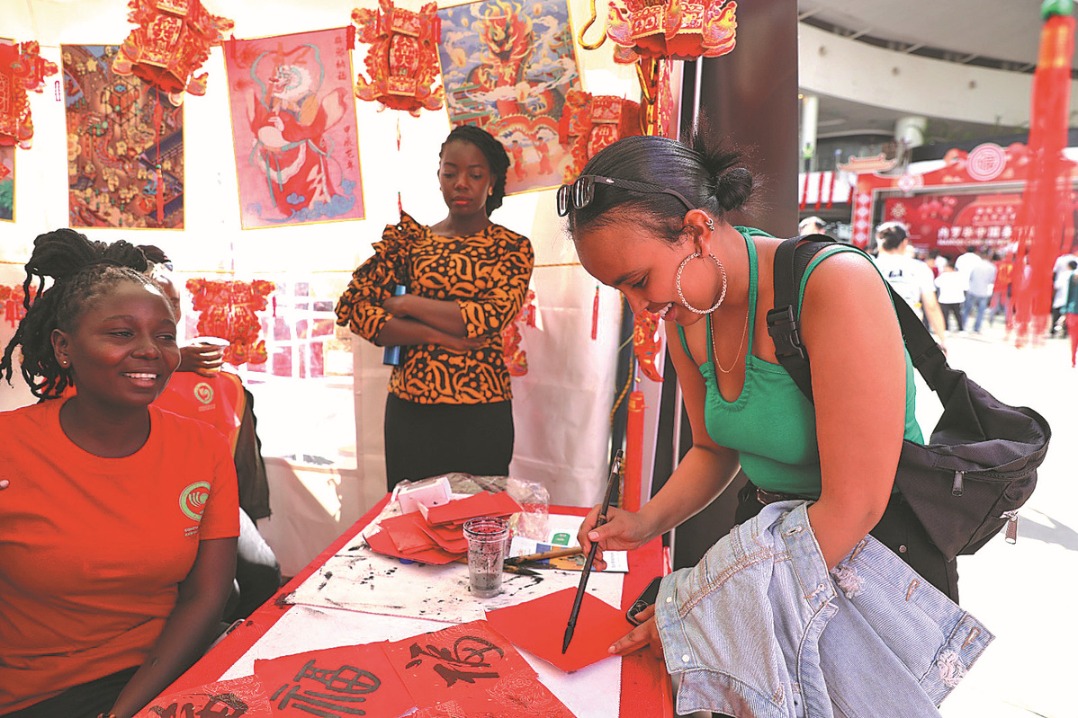Change of heart


The major economies of the Global North and the Global South need to demonstrate a stronger willingness to work together to collaboratively tackle global challenges
Editor's note: The world has undergone many changes and shocks in recent years. Enhanced dialogue between scholars from China and overseas is needed to build mutual understanding on many problems the world faces. For this purpose, the China Watch Institute of China Daily and the National Institute for Global Strategy, Chinese Academy of Social Sciences, jointly present this special column: The Global Strategic Dialogue, in which experts from China and abroad will offer insightful views, analysis and fresh perspectives on long-term strategic issues of global importance.
Both the Asia Pacific Economic Cooperation and the G20 were established during periods characterized by escalating economic globalization, burgeoning regional integration initiatives, and heightened cooperation between the Global North and the Global South. These were times of high optimism and expectations for the future. However, this year's APEC Peru meeting and the G20 Brazil summit took place amid increasing uncertainty and apprehension concerning economic globalization and global governance.
APEC was established in 1989, a pivotal time marking the end of the Cold War and the emergence of a new wave of globalization. This newly-formed forum, uniting the emerging Asian economies with major American economies, aimed to liberalize regional trade and facilitate investment. The inception of APEC coincided with the establishment of the World Trade Organization. In this context, both APEC and the World Trade Organization emerged during a period of vibrant and dynamic economic globalization.
The G20, founded in 1999, brings together the world's major developed G7 countries and the major emerging economies of the Global South. The G20 was a forum that emerged with the aim of both making global financial governance better in light of the extent of economic globalization and undertaking the global governance function that the United Nations could not perform sufficiently after it became sluggish. Indeed, over time, the G20 has extended its influence over a wide array of areas, ranging from global financial issues to climate change and various development concerns.
Today, the international system is grappling with two significant crises. First, following the 2008 Global Financial Crisis, the global economy and international trade have lost much of their dynamism. In the aftermath of the 2008 crisis, the primary issue addressed at the first G20 leaders' summit was the restoration of the world economy to its former vitality. However, significant progress had barely been made when the pandemic broke out in 2020, further complicating recovery efforts.
Second, escalating international and regional conflicts have inflicted damage on both the global economy and global governance. The Ukraine crisis that erupted in 2022 resulted in reciprocal sanctions between Western countries and Russia. Concurrently, significant disruptions began to affect the global food and energy supplies, exacerbating the impact of the crisis. These supply chain issues, coupled with political tensions, have further hindered the global economic recovery.
The Middle East crisis that erupted in 2023 was not confined to regional countries such as Israel, Palestine, Lebanon, Yemen and Iran. Instead, it manifested as a global economic and security risk that illuminated many issues, ranging from the security of international trade routes to the global energy supply.
The strategic and economic challenges that arose after the 2008 Global Financial Crisis not only undermined global governance but also hindered cooperation between the Global North and the Global South. The effectiveness of the G20 notably declined following the pandemic. While the Global North fortified its position within the G7, the Global South pursued policy development within BRICS, a grouping of leading emerging economies established in 2009.
Considering the high degree of integration in the global economy, it is implausible for developed and developing nations to independently resolve their issues. In this context, both the Global North and the Global South need to demonstrate a stronger willingness to work together to collaboratively tackle global challenges.
The primary agenda of the APEC Peru meeting and the G20 Brazil summit was to assess the global economic, political, security, and environmental challenges that have surfaced post-2008, and to strive for solutions, if possible. At this juncture, the effective preservation of global governance has become the central agenda for these leading international forums. Addressing global issues on multilateral platforms such as the G20 and APEC is essential for establishing an effective and efficient global governance mechanism.
China has endorsed the official agendas of the APEC Peru meeting and the G20 Brazil summit, that prioritize issues such as sustainable growth for resilient development, and eradicating inequalities, hunger and poverty. Chinese President Xi Jinping called on the G20 leaders to "work together for a fair and equitable global governance system".
Unlike APEC, a mega-regional platform, the G20 constitutes a true global forum in which emerging powers such as China and Turkiye can enjoy a privileged position. While Turkiye has a more global voice, China has already shown it is shouldering responsibility for the leadership for the Global South. China's Global Development Initiative, Global Security Initiative and the Global Civilization Initiative indicate that Beijing has become more eager to be a "role model "for the Global South and is willing to be a "mediator" in international conflicts such as those in Ukraine and the Middle East. Turkiye is also playing its part in facilitating resolutions to international conflicts and it is increasing its involvement in global security governance as well as global economic governance. In this regard, Ankara and Beijing share similar interests in pursuing a ceasefire in the Russia-Ukraine and the Middle East conflicts. In fact, one can say that many Global South countries are on the same page with China and Turkiye regarding global security issues.
The APEC Peru meeting and the G20 Brazil summit took place following Donald Trump's victory in the United States presidential election in early November. In this context, the most significant issue — though not officially on the agenda but discussed as a primary concern during the Peru and Brazil meetings — was the potential trajectory of US foreign policy under the new Trump administration. Key questions included whether the US would revert to trade protectionism, whether this would trigger new trade wars and the potential impact of such developments on economic globalization.
Potential new trade wars arising during a period of global economic slowdown could have detrimental effects on global development at large. The countries most likely to suffer from these trade wars would be the least developed countries. One of the central agendas of the G20 Brazil summit, the prevention of hunger and poverty, will become a more challenging objective to accomplish in an era where major economies are becoming increasingly inward-focused.
The potential re-withdrawal of the US from the Paris Agreement on Climate Change could create additional hurdles for efforts to address global environmental issues. The intensification of global economic cooperation, the resolution of development challenges, and the discovery of solutions to environmental issues can only be achieved with the full cooperation of G20 and APEC members.
In conclusion, the developed and emerging economies within the G20 and APEC must collaborate to devise solutions to global issues with an open and inclusive approach. Countries of the Global South, still grappling with the challenges of development, face more entrenched problems than those of the Global North. However, with their expanding economic capabilities, nations from the Global South within the G20, BRICS and APEC have the opportunity to propose more sustainable solutions to global issues.
In this context, the G20 and APEC economies must take the lead in initiating projects that benefit the international community at large, within the framework of North-South cooperation. The reform of existing international organizations, such as the UN and the WTO, as well as the modification of international rules for more effective global governance, carry the utmost significance. As such, platforms such as the G20 and APEC are invaluable for facilitating North-South dialogue in pursuit of resolving international issues.
The author is founding director of the Turkish Center for Asia Pacific Studies. The author contributed this article to China Watch, a think tank powered by China Daily. The views do not necessarily reflect those of China Daily.
Contact the editor at editor@chinawatch.cn.


































